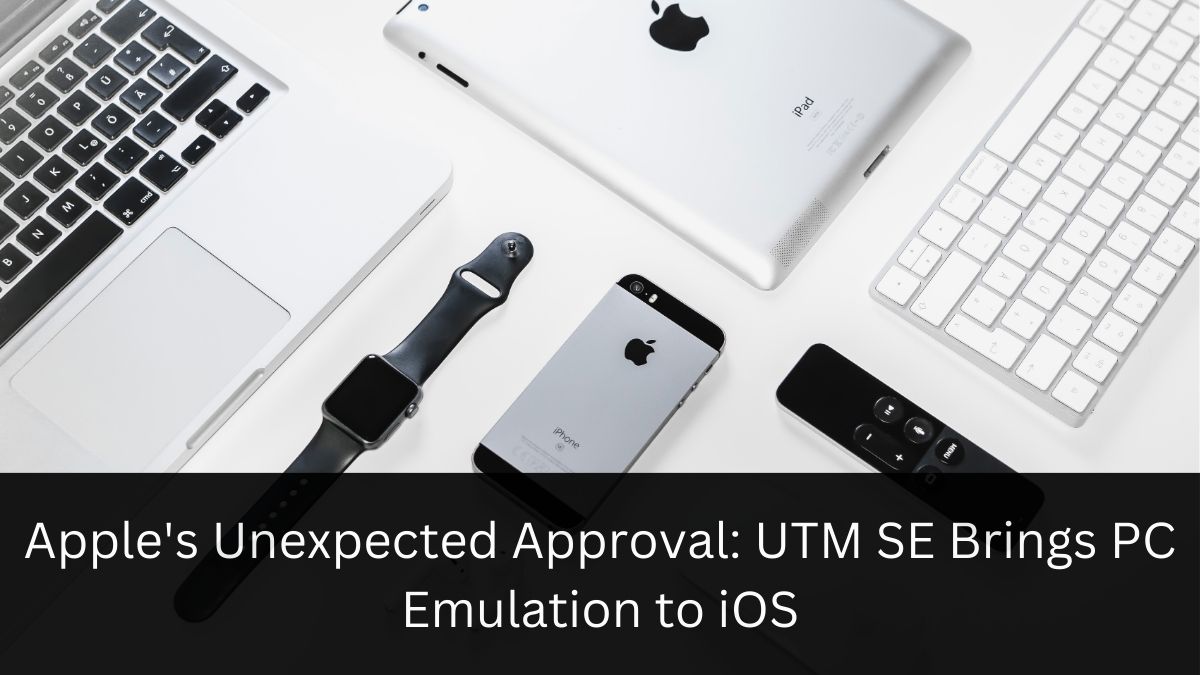Press Release
Apple’s Unexpected Approval: UTM SE Brings PC Emulation to iOS

In a surprising turn of events, Apple has given the green light to UTM SE, the first PC emulator for iOS devices. This decision marks a significant shift in Apple’s stance on emulation software and opens up a world of possibilities for iOS users eager to explore classic software and retro gaming experiences.
The Journey from Rejection to Approval
Just weeks ago, the tech community was abuzz with news of Apple’s rejection of UTM SE. The company had not only barred the app from its own App Store but also prevented it from being notarized for third-party app stores in the European Union. This initial rejection left many wondering if iOS users would ever have access to PC emulation capabilities on their devices.
However, in an unexpected twist, Apple has now reversed its decision. The approval of UTM SE represents a remarkable about-face, demonstrating the company’s willingness to reconsider its policies in response to developer and user feedback.
A Collaborative Effort
The road to approval wasn’t a solo journey for UTM SE’s developers. They credit the AltStore team for their assistance in navigating Apple’s stringent approval process. Additionally, they acknowledge another developer whose QEMU TCTI implementation played a crucial role in creating a JIT-less build of the app.
This collaborative effort underscores the importance of community support in the tech world. It’s a testament to the power of developers working together to overcome obstacles and bring innovative solutions to users.
What UTM SE Brings to the Table
UTM SE is not just another app – it’s a gateway to the past and a tool for exploration. This free application, available for iOS, iPadOS, and visionOS, allows users to emulate various computer systems, opening up a treasure trove of classic software and games.
Supported Architectures and Operating Systems
The app boasts an impressive range of capabilities:
- Emulation of x86, PPC, and RISC-V architectures
- Support for both VGA mode (for graphics) and terminal mode (for text-only operating systems)
- Ability to run pre-built machines or create custom configurations from scratch
While UTM SE doesn’t come pre-loaded with operating systems, it provides links to guides for emulating various Windows versions (from XP to 11), Linux distributions, Mac OS 9.2.1, and even DOS.
The Limitations and Potential of UTM SE
As with many emulators available on official app stores, UTM SE comes with certain limitations out of the box. Users won’t find any pre-installed virtual machines or operating systems within the app. This approach likely helped UTM SE navigate Apple’s approval process, as it avoids potential copyright issues associated with distributing operating systems.
However, this limitation doesn’t diminish the app’s potential. For tech enthusiasts and retro computing fans, UTM SE serves as a powerful foundation. With a bit of effort and know-how, users can transform their iOS devices into portals to computing history.
A Learning Opportunity
Setting up emulated environments in UTM SE isn’t just about nostalgia – it’s an educational experience. Users can gain hands-on experience with older operating systems, understanding the evolution of user interfaces and system architectures. This knowledge can be invaluable for aspiring developers, IT professionals, or anyone interested in the history of computing.
The Broader Implications of Apple’s Decision
Apple’s approval of UTM SE could have far-reaching consequences for the iOS ecosystem. It potentially signals a more open approach to emulation software on the platform, which could lead to several exciting developments:
- Increased Developer Interest: Other emulator developers might be encouraged to submit their apps to the App Store, leading to a wider variety of emulation options for iOS users.
- Preservation of Digital History: Easier access to emulators on iOS devices could contribute to the preservation and study of older software and operating systems.
- Enhanced Gaming Options: Retro gaming enthusiasts might find new ways to enjoy classic titles on their iOS devices, potentially sparking renewed interest in vintage games.
- Educational Opportunities: Schools and educational institutions could leverage emulators like UTM SE to teach computer history and operating system concepts more interactively.
Looking Ahead: The Future of Emulation on iOS
While the approval of UTM SE is undoubtedly a positive development, it’s important to remember that Apple’s policies can be subject to change. The tech giant has a history of revising its App Store guidelines, sometimes leading to the removal of previously approved apps.
For now, however, iOS users have reason to celebrate. The availability of UTM SE opens up new possibilities for exploration, learning, and nostalgia on their devices. It’s a reminder of how far computing technology has come – that we can now emulate entire PC systems on pocket-sized devices that are orders of magnitude more powerful than the original hardware.
As we look to the future, it will be interesting to see how the emulation landscape on iOS evolves. Will we see more emulators make their way onto the App Store? How will Apple balance its desire for platform control with the clear demand for these types of applications?
One thing is certain: the approval of UTM SE marks a significant moment in iOS history. It’s a step towards a more open and diverse app ecosystem, one that acknowledges the value of preserving and exploring computing history.
For those interested in diving into the world of PC emulation on iOS, UTM SE is now available for free on the App Store. Whether you’re a tech enthusiast, a retro gaming fan, or simply curious about the operating systems of yesteryear, this app offers a unique opportunity to explore computing history right from your iOS device.
